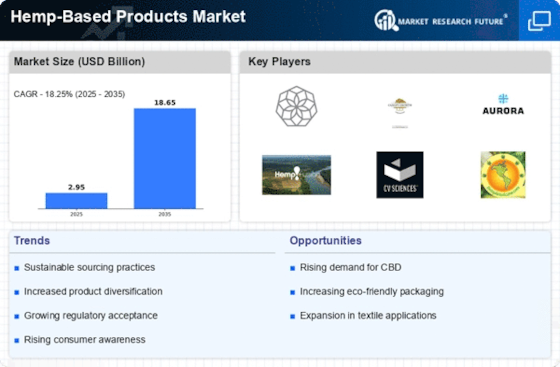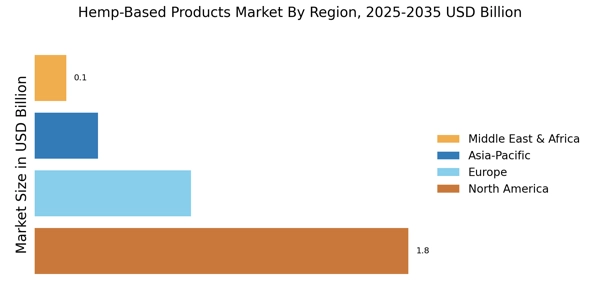Expansion of Hemp Cultivation
The Hemp-Based Products Market is poised for growth due to the expansion of hemp cultivation across various regions. As more countries recognize the economic potential of hemp, agricultural policies are evolving to support its cultivation. For instance, the area dedicated to hemp farming has increased significantly, with estimates suggesting a rise of over 50% in the last five years. This expansion not only enhances the supply chain for hemp-based products but also reduces costs associated with sourcing raw materials. Consequently, the Hemp-Based Products Market stands to gain from improved availability and affordability of hemp-derived ingredients, which could lead to a broader range of product offerings.
Increased Investment in Hemp Research
The Hemp-Based Products Market is benefiting from increased investment in research and development. Governments and private entities are recognizing the potential of hemp in various applications, leading to funding for studies on its health benefits, agricultural practices, and product development. This influx of research funding is expected to yield new insights and innovations, which could enhance the market's growth trajectory. For instance, studies exploring the therapeutic properties of hemp-derived compounds are gaining momentum, potentially leading to new product lines. As research continues to advance, the Hemp-Based Products Market may experience a wave of new offerings that appeal to health-conscious consumers.
Technological Advancements in Processing
Technological advancements in processing techniques are transforming the Hemp-Based Products Market. Innovations such as advanced extraction methods and improved manufacturing processes are enhancing the quality and efficiency of hemp-derived products. For example, new extraction technologies can yield higher concentrations of cannabinoids, which are increasingly sought after in the wellness sector. This evolution in processing not only boosts product efficacy but also aligns with consumer expectations for high-quality offerings. As a result, the Hemp-Based Products Market is likely to see an influx of innovative products that cater to diverse consumer needs, thereby expanding market reach.
Rising Consumer Demand for Natural Products
The Hemp-Based Products Market is experiencing a notable surge in consumer demand for natural and organic products. This trend is driven by an increasing awareness of health and wellness, as consumers seek alternatives to synthetic ingredients. According to recent data, the market for natural personal care products is projected to grow at a compound annual growth rate of 9.5% through 2027. This shift towards natural products is not limited to personal care; it extends to food, beverages, and textiles, where hemp-based offerings are gaining traction. As consumers become more discerning, the Hemp-Based Products Market is likely to benefit from this growing preference for transparency and sustainability in product sourcing.
Growing Acceptance of Hemp in Food and Beverage
The Hemp-Based Products Market is witnessing a growing acceptance of hemp in the food and beverage sector. As consumers become more health-conscious, they are increasingly incorporating hemp seeds, oils, and protein powders into their diets. Market data indicates that the hemp food market is projected to reach USD 1.5 billion by 2026, reflecting a robust growth trajectory. This acceptance is further fueled by the nutritional benefits of hemp, which is rich in omega fatty acids and protein. As more food manufacturers explore hemp-based ingredients, the Hemp-Based Products Market is likely to expand, offering consumers a wider array of nutritious options.


















